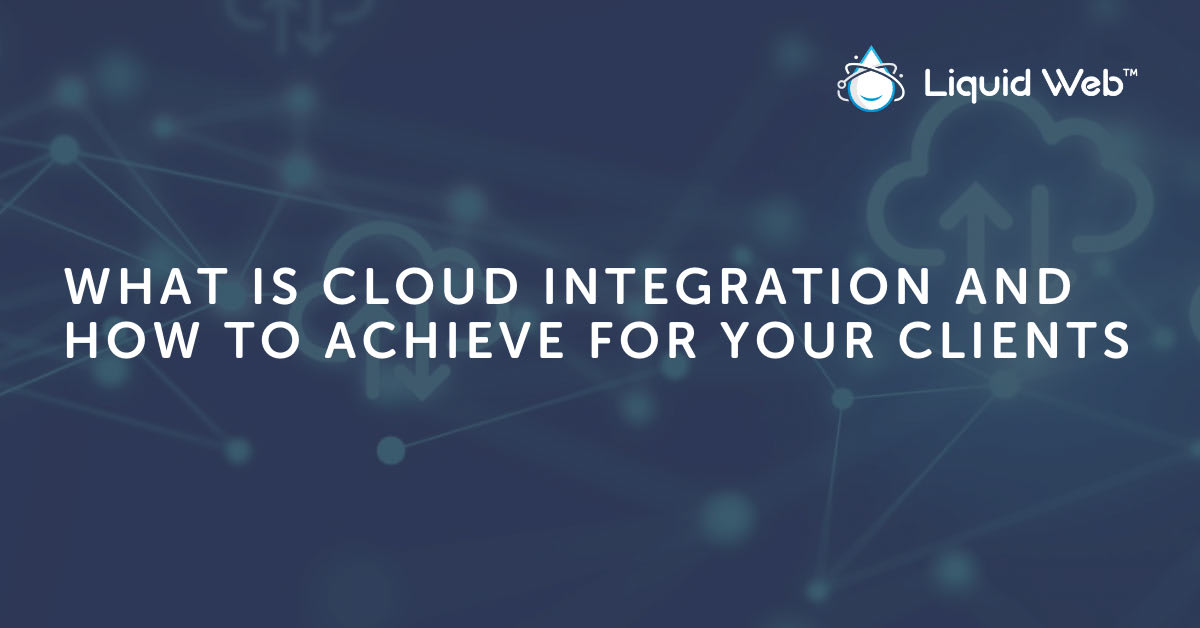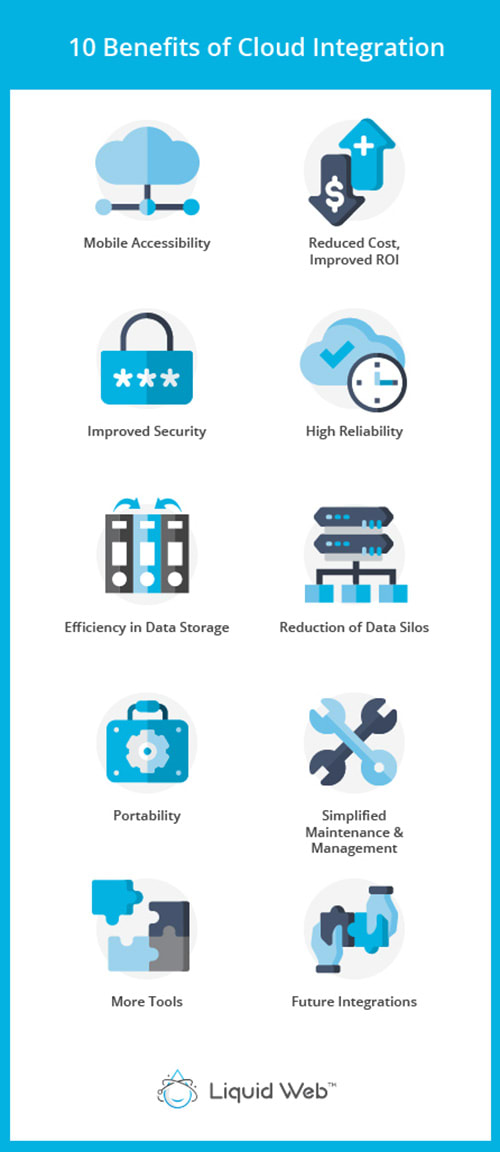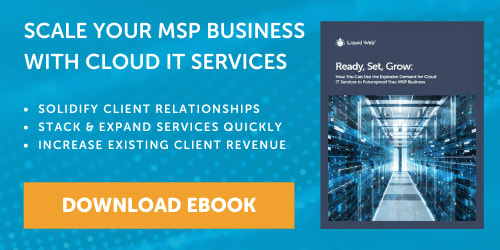
Is your managed service provider (MSP) planning a cloud integration and identifying potential benefits?
The proliferation of data in businesses of all shapes, sizes, and sectors means that business leaders can no longer ignore the importance of the cloud. Simply put, the cloud is about cost-effective, high-performance processing of data and applications and now plays a key role in the operation of most businesses around the world.
The connection of disparate systems extends to the cloud as well. Different applications and databases need to be integrated to drive peak performance for users.
Even tools built to work together via API or native integrations need to be set up and configured properly.
However, through cloud integration, a wide variety of benefits and improvements can be recognized by even the smallest or simplest businesses.
What is Cloud Integration?
A cloud integration combines cloud-based systems, applications, databases, and network components to streamline data and processes for a business.
Through cloud integrations, businesses have benefited greatly from:
- Flexibility in the sharing, storing, and accessing of data.
- Quick scalability and enormous agility.
- The ability to integrate both cloud applications and on-premises infrastructure and systems.
The goal of cloud integration is for all connected assets and applications to function seamlessly without causing friction.
As with other business integrations, driving more efficiency and effectiveness is the desired outcome of cloud integration.
Unifying different sources of information and different applications should break down silos across the business, enhance productivity, and improve processes for everyone.

Why Your Clients Need Cloud Integration
Your clients are likely leveraging more software than ever before in their quest to grow.
A growing amount of that software is cloud-based and delivered via SaaS tools or Software-as-a-Service. From QuickBooks Online for bookkeeping to Microsoft Office 365 for productivity, the cloud is increasingly present in small and mid-sized businesses worldwide.
Cloud automation and process improvements are driving significant business growth.
However, this utilization of the cloud does not come without complications. Most of these cloud-based services do not integrate right out of the box.
Furthermore, a significant amount of non-cloud technology is still in use for many businesses.
As an example, businesses with a single on-premise server keeping old telephone records to telephony systems that rely on hardwired infrastructure could greatly benefit from the cloud.
Your clients need cloud integration for business efficiency.
The more these systems and datasets can interact with each other, the more efficient their business can be.”
Efficiency leads to growth and advancement for the business. A business that isn’t improving runs the risk of losing to competitors.
If your clients utilize technology that is not integrated across their entire network, they create more work for themselves and, ultimately, put their business at risk.
Cloud integration allows the business to reach its full potential.

The 10 Benefits of Cloud Integration
Here are the ten benefits of cloud integration for your clients:
- Mobile Accessibility: A cloud integration allows for access to data and applications from any connected device at any time and from anywhere.
- Reduced Cost, Improved ROI: Cloud infrastructure is typically pay-as-you-go and does not require up-front capital expenditures. SaaS licenses can often be paid for by the month and per user, avoiding large upfront costs or enterprise licensing agreements.
- Improved Security: Cloud-based data and applications back up frequently to address any breach or interruption quickly. Additionally, cloud providers and software publishers handle the physical security of infrastructure and at least some level of application security.
- High Reliability: Cloud infrastructure provides much higher availability and reliability than traditional infrastructure. This reliability means that service interruption or even a speed reduction is rare for those using the cloud.
- Efficiency in Data Storage: In many organizations, the same data is stored in multiple places. Sometimes, this is simply an artifact of the passage of time and repeat work. New team members join a company, others leave. As a result, data stored in one place finds its way to being stored in another place as well. With cloud integration, data syncs in a way that redundant storage can be a thing of the past. This creates more cost savings, better resource allocation, and a more secure IT environment.
- Reduction of Data Silos: Data storage and utilization is more efficient with cloud integration. With all information stored in the same cloud environment, more applications can work together with the same data sets, improving workflows and processes across the organization. For example, a data silo between customer support and sales can be broken down when all data is accessible in the same environment.
- Portability: Cloud infrastructure requirements change along with the organization’s needs. While the hope is for your cloud infrastructure to serve you well for years to come, occasionally, changes have to be made. Integration with the cloud allows for greater application and data portability than utilizing in-house or colocated servers.
- Simplified Maintenance and Management: IaaS, PaaS, and SaaS (explained further below) providers most often manage and maintain the infrastructure and underlying network of the solutions they provide. Full management means that businesses integrating with the cloud recognize cost savings, reallocate technical resources away from the server and network management, and point them towards core competencies.
- More Tools: Cloud integration means choice. From a selection of different cloud environments to a choice of different cloud-native applications, services, and solution providers show that the cloud is the future of technology. As such, whether you are looking for a new ERP system or a secure location for data backups, the cloud provides the most options for your consideration.
- Future Integrations: As organizations adopt different applications and needs evolve, future integrations will be necessary. Thankfully, the cloud was purpose-built with integrations in mind. From native integrations between systems to the widespread (and growing) use of APIs and microservices, the cloud makes it simple to continue integrating systems over time for maximum efficiency.
Cloud Integration for Your Clients
Once you understand why your clients might want to integrate with the cloud and its benefit, it is vital to identify how you can help make such an integration successful.
From data storage and backups to full-on connected applications, there are a number of ways to help your clients integrate their necessary systems and tools in the cloud.
Here are the three most common types of cloud integrations.
Infrastructure-as-a-Service
Infrastructure-as-a-Service (IaaS) removes the need for your own physical hardware like web servers and network switches. IaaS lets businesses manage workloads without needing their own system administrators or IT experts.
IaaS puts infrastructure care and feeding in the hands of a trusted managed services provider, like your business.
Platform-as-a-Service
Platform as a Service (PaaS) takes IaaS a step further by including cloud-based tools that make it even easier to recognize the benefits of the cloud.
From APIs and gateways to code repositories and security integrations, PaaS helps give businesses even more opportunity to focus on work while leaving the complexity of the cloud to a managed service provider.
Software-as-a-Service
Software-as-a-Service (SaaS) delivers software via the cloud with all of the necessary infrastructure and platform management handled by the vendor or publisher.
Your clients recognize both the functional and financial benefits of using SaaS.
Ensuring all systems are set up properly and work well together is never a simple task for these integrations.
As a managed service provider, the role you play in client success hinges on making sure these disparate systems all work together.
How MSPs Help Clients with Cloud Integrations
A managed service provider can help remove some or even all of the cloud management obligations from the client’s responsibility, filling the gap between SaaS, IaaS, or PaaS providers and complete client solutions.
Furthermore, a managed service provider can help with data migration and make sure all cloud-based tools work in concert, driving the best value and highest possible performance.
As a managed service provider, your clients are likely already asking you to migrate to the cloud and modernize applications. Your experience and expertise do not need to be at odds with a move to the cloud.
Rather, your team can be the force that helps make a cloud migration and integration a success.
Cloud Integration for Your Managed Service Clients
Moving clients to the cloud doesn’t just make business sense; it is also the right thing to keep their technology investments on point. Introducing the cloud to your clients means also showing them how to integrate their tools and applications in the cloud.
When considering how the cloud can benefit your customers and their businesses, focus on the cost savings and improved efficiency that they will realize. The return on investment for each client will be significantly easier to prove when looking through that lens.
If you are eager to integrate more applications into the cloud for your clients, our team at Liquid Web can help. From VMware Private Cloud deployments to professional migration services, our years of experience helping managed service and IT providers make Liquid Web a partner you can trust.
Contact us today to learn how Liquid Web can help your managed services clients recognize the benefits of cloud integration.
[ad_2]
Source link


![Cloud Integration [What It Is & 10 Benefits]](https://dealzclick.com/wp-content/uploads/2022/02/Chromebook-Shipments-Declined-Globally-in-Q4-Acer-Surpasses-HP-Lenovo.jpg)
![Cloud Integration [What It Is & 10 Benefits]](https://dealzclick.com/wp-content/themes/rehub-theme/images/default/noimage_70_70.png)



